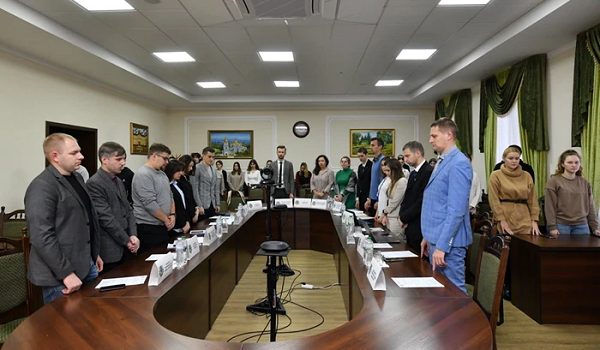Science and education unite: Researchers from Sweden and Ukraine drive sustainable progress
On November 21-22, 2024, National University of Life and Environmental Sciences of Ukraine (NUBiP), in collaboration with other international partners, hosted a scientific conference dedicated to addressing pressing global challenges in education, science, and sustainable development. This hybrid event gathered experts, researchers, and young scientists from several countries to exchange ideas and present their contributions to the advancement of sustainable practices in diverse fields.
The conference featured a wide range of thought-provoking topics across two days. Key themes included sustainable education and different methods in pedagogy, the integration of artificial intelligence in agriculture, advancements in food sustainability, and the use of geographic information systems for post-war reconstruction in Ukraine. Other presentations addressed challenges such as global warming's impact on feed production, genetic resources conservation, and innovative techniques in crop breeding.
In her presentation, Cecilia Almlöv from EPU, SLU, explored the role and responsibilities of novice doctoral co-supervisors, emphasizing their support for the academic and personal well-being of PhD students. Galia Zamaratskaia presented the perspectives of Ukrainian university lecturers on the flipped classroom teaching model. Joanna Lipsa from Wrocław University of Environmental and Life Sciences, Poland, talked about transforming higher education in the age of pandemic, and highlighted the challenges of remote learning and university enrolment.
The integration of artificial intelligence in agriculture was also in focus during the conference. Andriy Getya from NUBiP focuses on how artificial intelligence methods are being applied to improve animal breeding programs. Roman Dmytryshyn from Research Institute of International Relations of Taras Shevchenko National University of Kyiv explained the principles of agricultural business management in the international competitive world by using artificial intelligence.
The participants of the Ecotwins project also took an active part in a scientific conference, where they presented the results of their research. In particular, Roman Tomashevskyi delivered a presentation titled "Assessment of the Impact of Fertilization on Soil Physical Properties and the Productivity of Three-Component Mixed Crops." In his presentation, he detailed the effects of various fertilization schemes on soil structure and water permeability, as well as the yield of mixed crops of legumes and cereals, which is a significant aspect of the project's research.
“This conference is very important, because it brings together experts and young scientists to discuss how education and science can help tackle the pressing challenges of our time, such as climate change, military conflicts, and sustainability”, says Galia Zamaratskaia.
“By focusing on the role of young scientists, this conference highlights how they can drive innovation in research and education. Young minds are essential for addressing future challenges, and collaborating with experienced researchers can help bring fresh ideas to solve global problems”, adds Nataliia Hryshchenko, the head of the Union of Young Scientists of NUBiP, and chair of the conference.
“We, young scientists, have fresh perspectives and innovative solutions that can contribute to sustainable development in all sectors”, confirms Mykhailo Matvieiev from NUBiP.
This event not only demonstrated the resilience and creativity of the academic community in the face of global and local challenges but also underscored the importance of international collaboration. The active involvement of young researchers highlighted their pivotal role in driving sustainable development and innovation.
